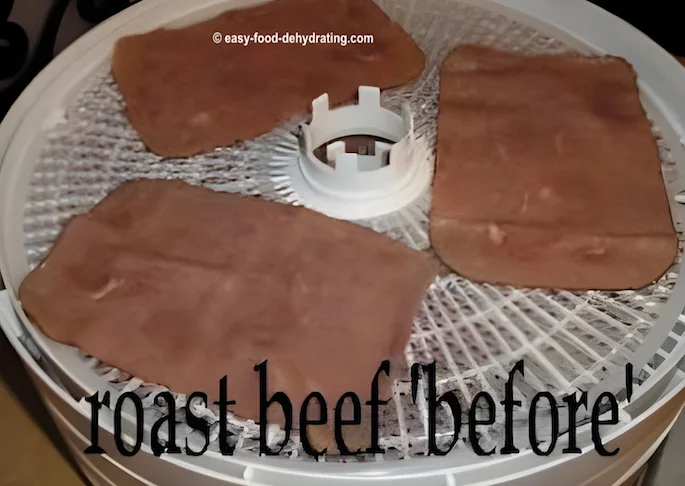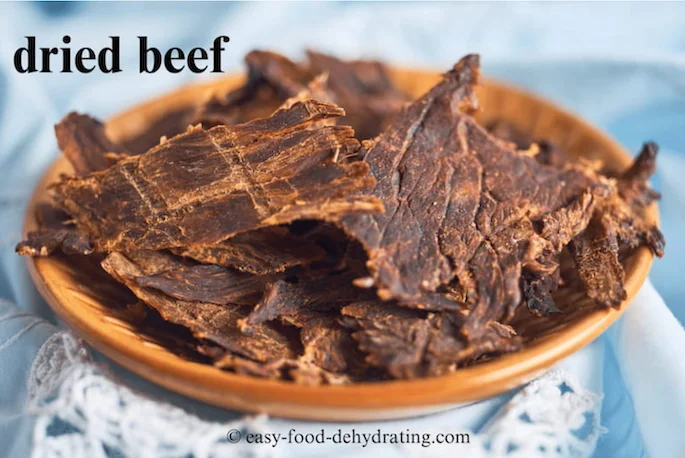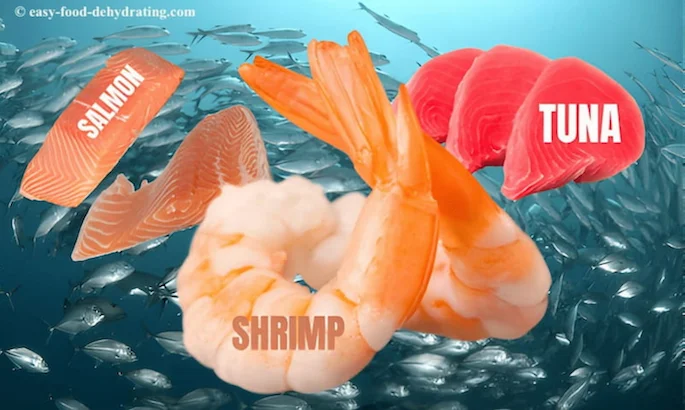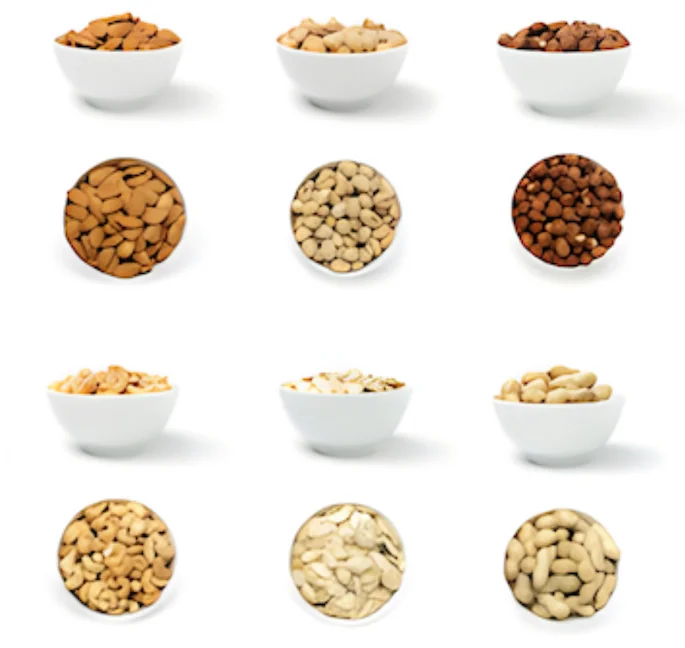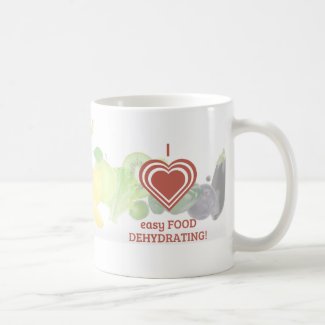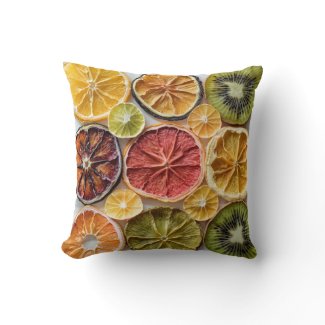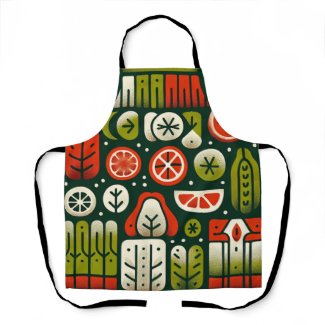How to Dehydrate Chicken
Using Pre-Cooked, Pre-Sliced Deli Chicken Breast!

Susan Gast | Author and blogger at Bored Boomers, Beesville Books, A New Sober You and Easy Food Dehydrating
If you're looking to dehydrate chicken safely and effectively, you're in the right place! Using pre-cooked, pre-sliced chicken breast—either from the deli counter or pre-packaged in tubs—is one of the simplest ways to get started.
This guide will also cover how to dehydrate leftover roasted or baked chicken.
Chicken Before and After Dehydration
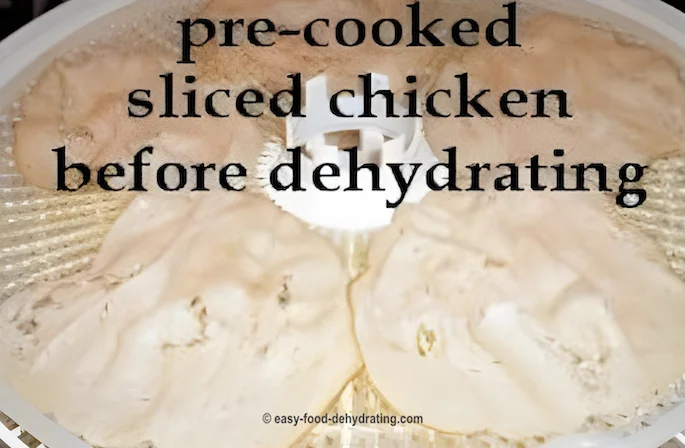 Before Dehydration: Pre-cooked, sliced chicken on Nesco dehydrator trays.
Before Dehydration: Pre-cooked, sliced chicken on Nesco dehydrator trays. After Dehydration: Crisp, dehydrated chicken ready for storage.
After Dehydration: Crisp, dehydrated chicken ready for storage.Frequently Asked Questions
What's the ideal temperature for dehydrating cooked chicken?
What's the ideal temperature for dehydrating cooked chicken?
Dehydrate cooked chicken at 160°F. Always check your food dehydrator’s manual for specific instructions.
Can you use a regular oven to dehydrate chicken?
Can you use a regular oven to dehydrate chicken?
Yes, you can. Keep reading to learn the oven method.
Can you dehydrate canned chicken?
Can you dehydrate canned chicken?
Yes, canned chicken can be dehydrated. Low-fat canned chicken works best as it avoids rancidity during storage.
How to Dehydrate Chicken on a Dehydrator Using Pre-Cooked Sliced Deli Meats
- Prepare the Trays: Arrange pre-cooked, pre-sliced chicken evenly on the dehydrator trays. Ensure slices do not overlap.
- Set the Temperature: Use a setting of 160°F for safe and effective dehydration.
- Monitor and Rotate: Rotate the trays periodically for even drying. While this step may not be in your dehydrator manual, it ensures consistency.
- Check for Crispness: The chicken is fully dehydrated when it feels crisp.
💡 Tip: Use our Fahrenheit to Celsius converter here on our site!
Store the dehydrated chicken in food vacuum-sealer bags with a 100cc oxygen absorber for long-term freshness.
How to Dehydrate Chicken Using a Regular Oven
- Preheat the Oven: Set your oven to its lowest temperature, usually around 150°F–170°F.
- Arrange the Chicken: Place chicken slices on a wire rack, ensuring airflow around each piece.
- Keep the Door Slightly Open: Use a wooden spoon to keep the oven door ajar for proper air circulation.
- Monitor Progress: Check the chicken every couple of hours until it reaches your desired crispness.
Important: Only dehydrate cooked chicken, never raw.
Dehydrating Leftover Dinner Chicken
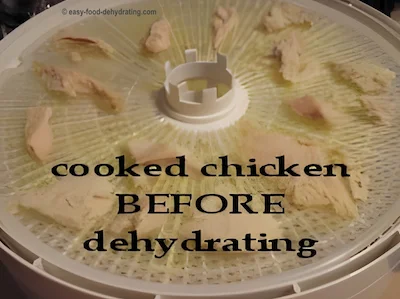
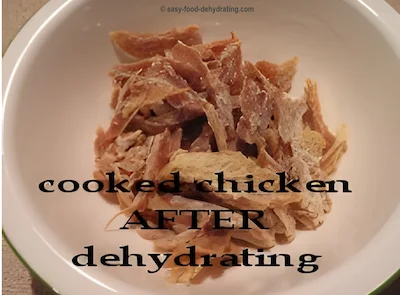
How to Make Chicken Jerky
Need a protein-packed snack? Make this homemade chicken jerky! A food dehydrator simplifies the process, letting you create flavorful, chewy jerky anytime.
Skip store-bought snacks and enjoy a healthier alternative. With just a few spices and some marinating, you’ll have a delicious treat perfect for hiking, road trips, or snacking at home.
Delicious and Easy Chicken Jerky Recipe

This chicken jerky is made from lean chicken breasts, marinated with a blend of savory spices, and dehydrated to create a chewy, flavorful snack. It’s slightly sweet, smoky, and wonderfully savory.
Enjoy the satisfaction of creating your own jerky, tailored to your taste preferences, without any preservatives or artificial additives.
Ingredients:
- 2 pounds boneless, skinless chicken breasts
- 1/4 cup soy sauce
- 2 tablespoons brown sugar
- 1 teaspoon garlic powder
- 1 teaspoon onion powder
- 1 teaspoon smoked paprika
- 1/2 teaspoon black pepper
- 1/2 teaspoon red pepper flakes (optional for heat)
Instructions:
- Prepare the Chicken: Slice the chicken breasts into thin strips, about 1/4 inch thick.
- Make the Marinade: In a bowl, mix the soy sauce, brown sugar, garlic powder, onion powder, smoked paprika, black pepper, and red pepper flakes until well combined.
- Marinate the Chicken: Place the chicken strips in a resealable plastic bag or shallow dish and pour the marinade over the top. Seal or cover and refrigerate for at least 4 hours, preferably overnight.
- Dehydrate: Remove the chicken from the marinade and pat dry with paper towels. Arrange the strips on the dehydrator trays in a single layer, ensuring they do not overlap. Set the dehydrator to 160°F (70°C) and dry for 4-6 hours, or until the jerky is dry and chewy.
- Store: Allow the jerky to cool completely before storing it in an airtight container. It can be kept at room temperature for up to 1 week, or refrigerated for longer shelf life.
Prep Time:
- Prep Time: 15 minutes
- Marinating Time: 4 hours
- Dehydrating Time: 4-6 hours
- Total Time: 4 hours 15 minutes to 6 hours 15 minutes
Nutrition Information:
- Servings: 8 servings
- Calories: 150kcal
- Fat: 2g
- Protein: 28g
- Carbohydrates: 4g
Using Higher Heat for Safe Dehydration
Always dehydrate chicken at 160°F. Using lower temperatures increases the risk of bacterial growth, making it unsafe to consume.
Critical Safety Tip: Always Dehydrate at 160°F
never dehydrate meat at a lower temperature,
it's not safe (germ-wise).
Critical Safety Tip:
Always Dehydrate at 160°F
never dehydrate meat
at a lower temperature,
it's not safe (germ-wise).
💡 Tip: Use our Fahrenheit to Celsius converter here on our site!
Rehydrating Chicken for Added Flavor
Rehydrated chicken can taste even better with the right technique:
- Soak dehydrated chicken slices in chicken stock (I recommend "Better Than Bouillon") or clean water.
- Let it sit in the refrigerator for about 30 minutes.
- Once rehydrated, the chicken will regain its moisture and tenderness.
This process adds flavor and makes the chicken ready for soups, salads, or other dishes.
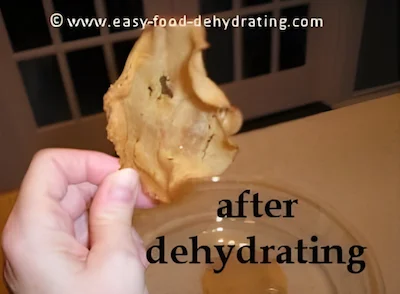
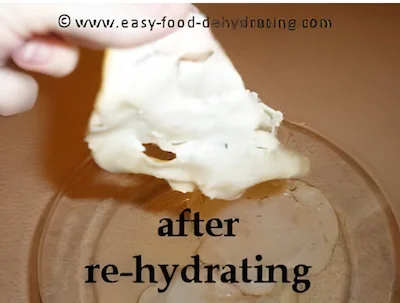
In the photo above, you can see just how crispy the chicken was after dehydrating! I then purposely draped a slice of the rehydrated chicken around my finger so you could see that it was indeed moist again.
Make a small amount of chicken stock (from my favorite Better Than Bouillon) and wow, what a difference it makes to the taste of the rehydrated chicken! Make a note of that! :-)
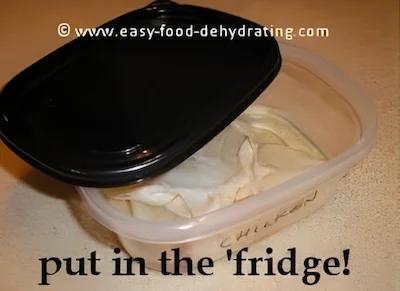
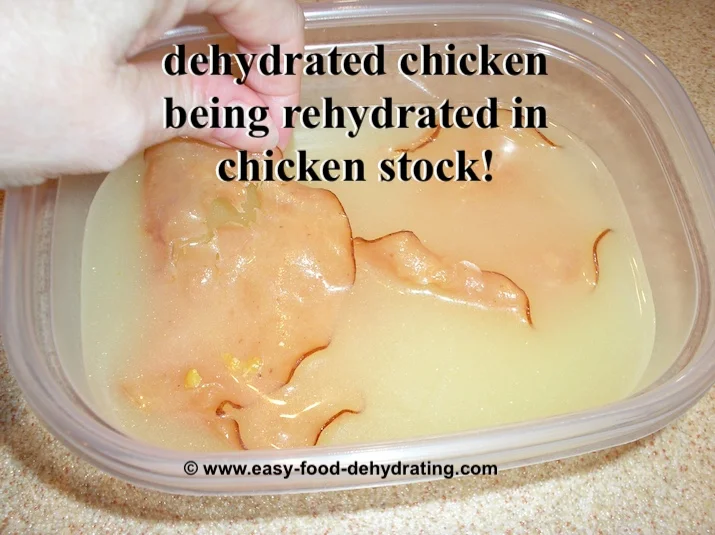
Bonus Tip: Dehydrating Canned Chicken
For long hikes or convenient meal prep, canned chicken is an excellent option. According to Sarah in Australia, canned chicken dehydrates and rehydrates perfectly. She recommends using low-fat varieties to avoid spoilage during storage.
"I do a lot of dehydrating for long hiking trips and have found that the canned chicken (that looks like canned tuna) in the supermarket (yes sounds gross) is the only chicken I've been able to dehydrate that re-hydrates exactly like it was prior. Taste and texture on rehydration is perfect for chicken, just remember to buy the low-fat canned chicken."
NOTE: I have used 'canned chicken' in soups and chicken salad! :-) And yes, the low-fat stops rancidity when storing "long term". Thanks so much for posting!
Dehydrate Cooked Pork Too!
This morning I had Robert S. write in to ask if it's OK to dehydrate cooked pork.
Answer: YES... (here's how!)
I also thanked him for bringing it to my attention that I hadn't listed pork alongside the chicken, turkey, and beef! I have now, and here is how to dehydrate pork.
Thanks!
Storage Tips
Store dehydrated chicken in vacuum-sealed bags or airtight containers. Add oxygen absorbers to prevent spoilage and keep in a cool, dry place.
Free Resource
Don't forget to grab your free Six Simple Steps eBook! It’s packed with tips for dehydrating everything from fruits and veggies to dog treats. Get it here.
Before You Go...
If you like the content, please give me some love by clicking on the 🩷 in the lower right hand corner (on just about all my pages). This signals to me that you find it enjoyable and useful. Thank you so much!
